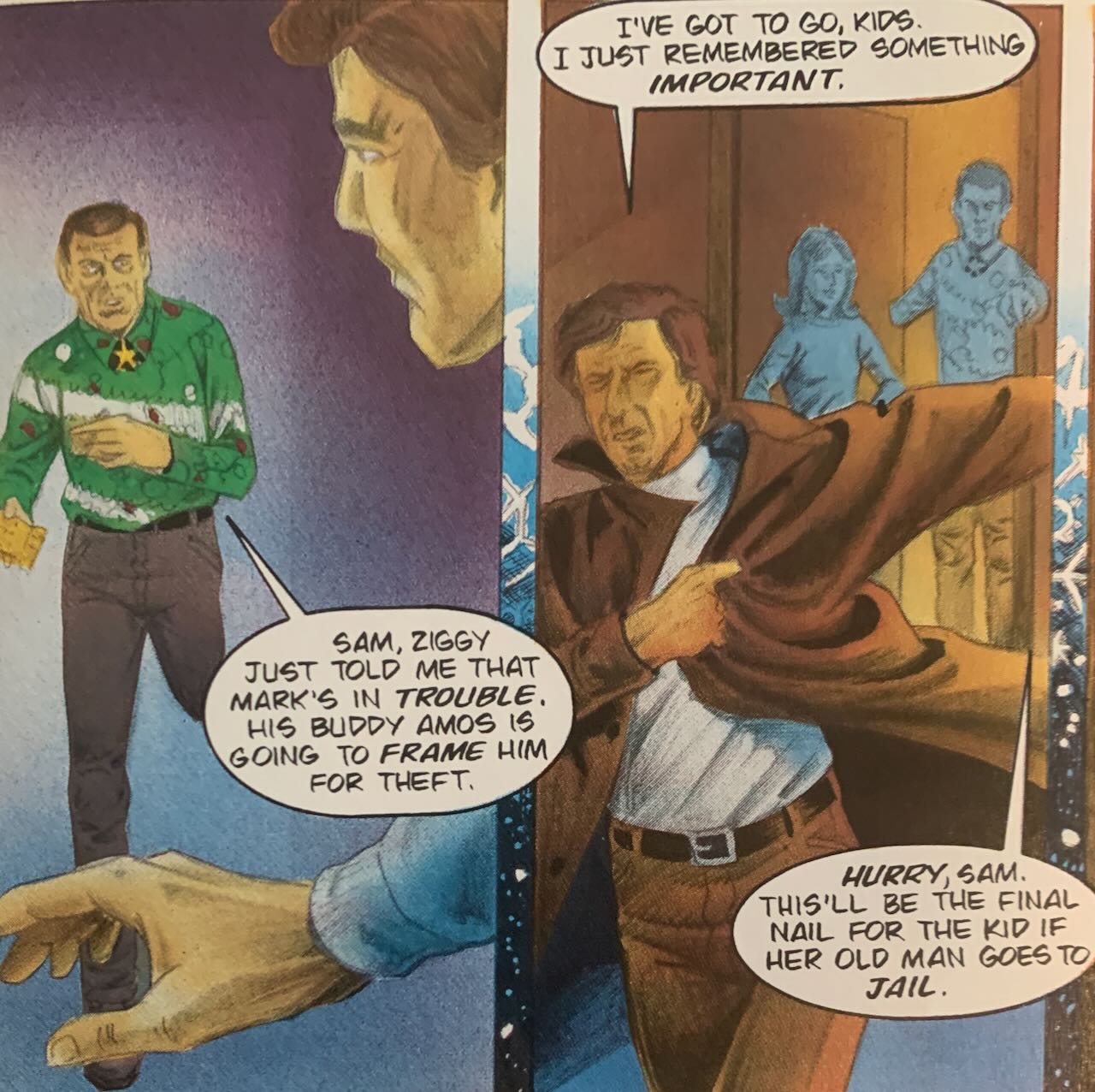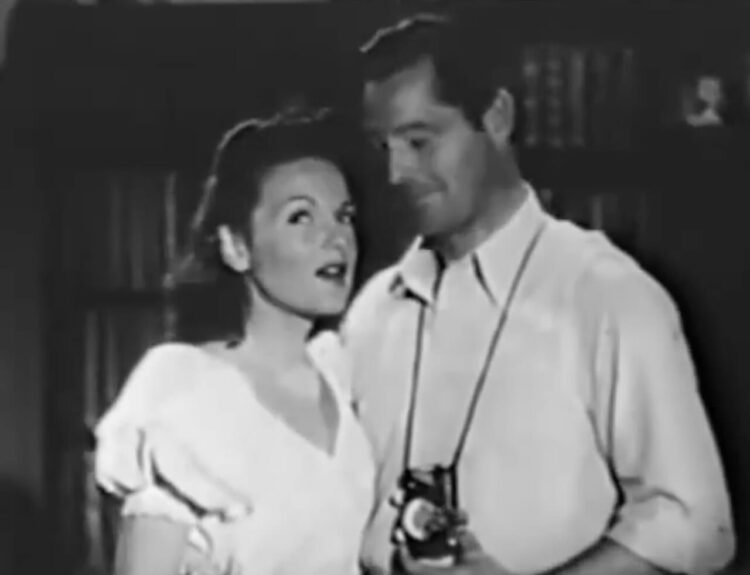Sam leaps into a department store Santa named Nick in 1963, who just might be the real thing. He has to help restore a young girl’s belief in the spirit of Christmas, while also helping her father to not be framed for theft by a dishonest fellow employee.
Story – John Holland. Illustrator – Andy Price. Letterer – Vickie Williams. Colorist – Scott Rockwell. Editor – George Broderick, jr. Created by Donald P. Bellisario.
Previous Issue: Freedom of the Press (Quantum Leap #2) • Next Story: The Infinite Corridor (Quantum Leap #3b)

Comments:
He Knows if You’ve Been Bad or Good… is kind of like a Christmas episode of Quantum Leap (something we actually got on TV a few times). There’s some fun to be had with it but it’s not terribly engaging. Sam is “Nick”, who might or might not be the actual Santa Claus, and his job is to help restore a young girl’s faith in Christmas. That girl, Shannon, struggles because her widowed dad Mark kind of neglects her and her younger brother because of the late hours he puts in at the department store and because of all the extra time he spends helping his neighbours. Perhaps because this concept doesn’t give a lot of room for anything to actually happen, there’s also a thread about Mark being framed for embezzlement by his shady colleague Amos. But all of it gets resolved in a feel-good ending that results from hardly any effort at all from Sam, and so it’s not very satisfying.
The story only takes up about half of issue #3 of the comic (the second story will have its own post) so part of the issue is just that there isn’t a lot of room to develop anything. As a result, certain plot points that feel like they might have been important happen completely off-panel (for instance, Sam meeting Mark at all and getting to know him) while others, such as the threat posed by Amos or the finale, are rushed.
A lot of this story feels cribbed from other places, mostly Miracle on 34th Street but also It’s a Wonderful Life (at the end, the community rallies together to support a guy who has dedicated his life to serving others, and is now struggling as a result). These deliberate homages don’t automatically mean the story has to fail–lots of Quantum Leap was actually like this. But it always works best when the story has it’s own take or perspective on the familiar concept, and here there just isn’t anything like that. So the combination of the story being both short and over-familiar makes for a pretty thin reading experience.

I’m also not a big fan of the art. I think the compositions and visual storytelling are good, but the actual rendering of the characters feels clunky to me. That said, I don’t have a strong eye for comic art, but the impression that I get is that the comic is full of action figures that are a little off anatomically, and that one can’t pose quite the way you want to.
And finally on the negative side, there’s this weird thing going on in the story where nobody is sure whether Sam might be the real Santa Claus. That’s a classic Quantum Leap take on the whole concept. But a couple of times in the course of the plot Sam and Al run into these weird elf-people who seem to be living in Sam’s apartment, who add to the evidence that Sam is Santa Claus. But we never hear the guys talk about this, or see Sam try to talk to the elves, or actually push the concept in any way even though it’s arguably the most interesting thing going on. The elves can even see Al! It’s meant to be a cute bit, but instead just becomes a point of frustration for me.
Having said all that, the comic is aiming to tell an uplifting holiday story, which I appreciate. And there is a bunch of cute extra art in the margins of the page, and a bunch of other “easter eggs” in the panels, which provide some fun. I just wish it had all been in service of a better main story.

Who and Where is Dr. Sam Beckett?
Sam is Nick (no last name identified) who is a department store Santa at a store called Davenports, who is implied to be the real Santa Claus, from December 20-24, 1963. The city where all this is happening is never specified, but given there is a 34th St and the general vibe of things, the impression one gets is that it’s New York City.
What does Sam have to do?
Sam has to help restore Jessie’s faith in Christmas, as well as to help her father Mark not be framed for embezzlement from the department store he works in.
What do we learn about Sam Beckett?
Sam mentions that he is getting pretty good at finding homes after all this time Quantum Leaping.
What do we know about Al?
Al isn’t sure if he believes in Christmas.
What about the experiment?
As has happened before, one of the kids (Mark’s youngest) can see Al. But so can the mysterious “Elf” character that seems to live in Sam’s home. However, unlike before, neither of them seem to realize that it’s Sam standing before them, and not Nick.

Ziggy didn’t realize that Mark was in danger earlier until the last minute because he was too preoccupied researching Nick’s background.
“Driven by an unknown force…” (God or Time or Something)
No reference to this here.
“Oh Boy”
The catchphrase is heard as Sam leaps in on the first page. Specifically, he says, “Oh boy, what’s going on now?”
Sam’s Complicated Love Life
There’s no romance for Sam in this story.
The Many Loves of Al Calavicci
There is no overt romance for Al, but he does spend time ogling the rear end of a woman working as a department story Christmas elf, and also a mannequin wearing a bra.
There is a brief reference to Al’s girlfriend Tina and Sam’s wife Donna, in the little extra images in the margins (details below).
Other Observations
• Unusually, Al is present with Sam right from the start of the Leap, but I guess given how short this story is there really isn’t any room to spare getting him there.
• Like I said, there are little drawings in the margins of most pages which provide some extra interest. This starts on Page 2 of the comic, which depicts some Christmas sheet music. On Page 3 there are some squirrels playing with Christas ornaments. On Page 5 there are three foxes carolling, specifically singing The First Noel. And so on.
• Visible vaguely in the background of one image is a movie theatre showing Psycho, which came out three years earlier.
• In the most Easter Eggy margin image, Page 6 shows parts of Christmas stockings for a whole bunch of characters. We can see Gooshie, Dr. Beeks (who has a stethoscope), Tina, Al (who has what seems to be an issue of Playboy, Sam (whose stocking is empty) and Donna (who has a book that seems to be called Absent Husbands.


• Nick lives on 34th Street, in apartment 25, both of which are Christmas references.
• The story’s villain, Amos, is an unpleasant scowling man but he wears a button that amusingly says, “Laugh and the world laughs with you.”
• In a cute detail in one group scene, we can see the girl that Al was ogling earlier, who plays an elf in the story, receiving a teddy bear from a guy who is presumably her boyfriend as a gift.
• In another funny detail, Mark is seen carrying a box which apparently contains a “Baby Belchie” doll toy. I’m pretty sure that’s not a real thing.
• One of the bits of graffiti in Sam’s jail says “Re-elect Judge Harry Stone”, which is the name of the judge from the long-running sit-com Night Court. Whether we are to believe it’s the same guy or not, it’s hilarious to imagine someone in jail advocating for a judge to retain his position via graffiti.
• Even though several days pass for Sam, Al is always seen wearing the same Christmas tree-themed shirt throughout the story.

• The story ends with a little Christmas message at the bottom of the last page: “…AND TO ALL, A GOOD NIGHT.”
Sam Leaps To…
…nothing. It’s not depicted.
Favorite Dialogue
This is hard to choose because I find the story so unremarkable that nothing stands out. I guess I’ll go with Sam’s line to Shannon as he tries to show her why her father’s servant-attitude is so meaningful to people:
Those people your dad helps see those groceries or that unpluggled drain as little miracles that help them get through the day.
The Best Moment
Similar to the above, I’m not sure, but I’ll go with the bit at the very end where Sam and Al see that one of the elf-like people telling Sam it’s time to get to work has pointed ears. It’s just a bit of visual storytelling that I appreciate.

Although my actual favorite thing in the issue is the cover, by C. Winston Taylor (image up top), which I think is a lot of fun.
Previous Issue: Freedom of the Press (Quantum Leap #2) • Next Story: The Infinite Corridor (Quantum Leap #3b)
Movie News
Berita Olahraga
News
Berita Terkini
Berita Terbaru
Berita Teknologi
Seputar Teknologi
Drama Korea
Resep Masakan
Pendidikan
Berita Terbaru
Berita Terbaru
Berita Terbaru



